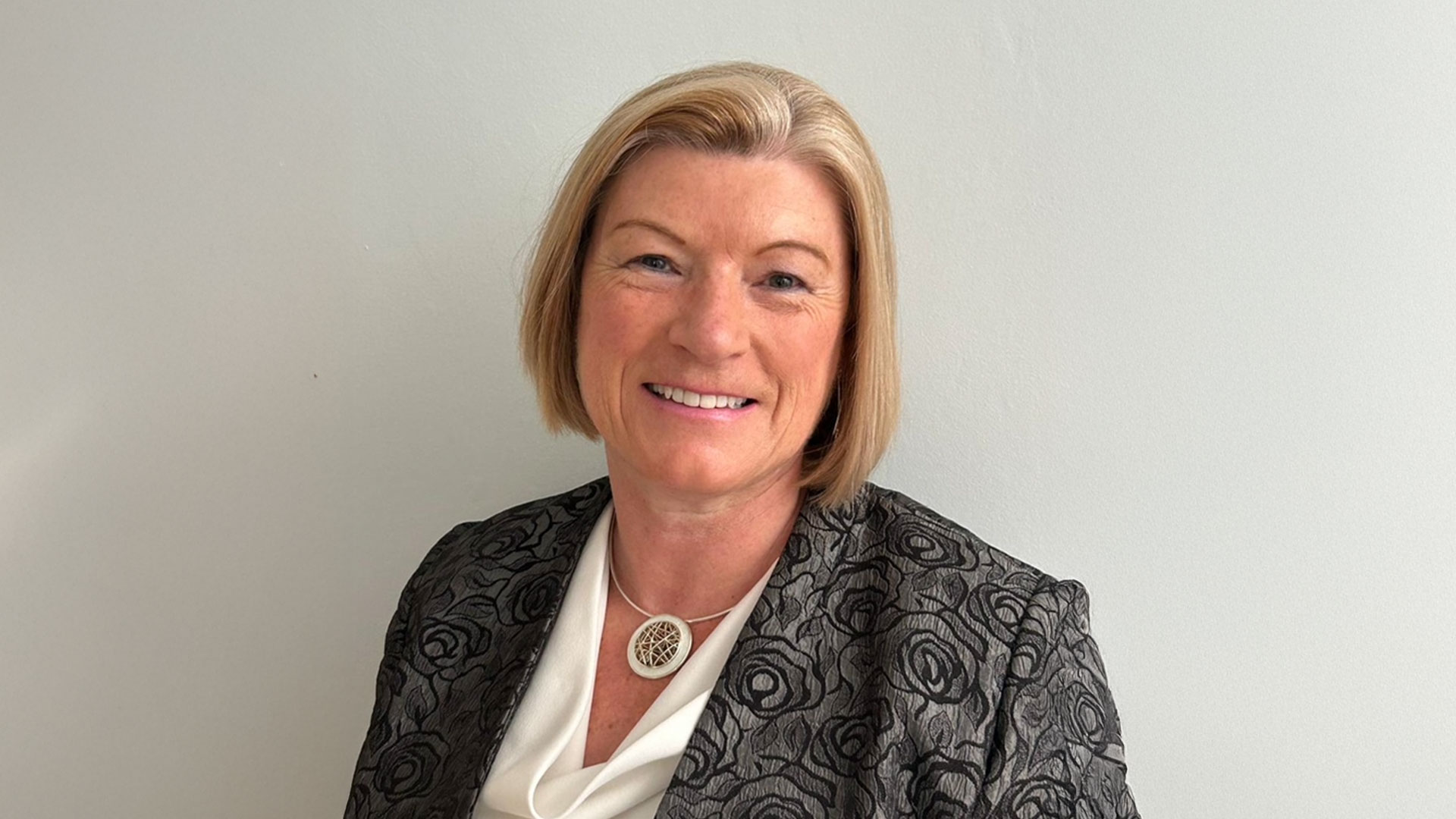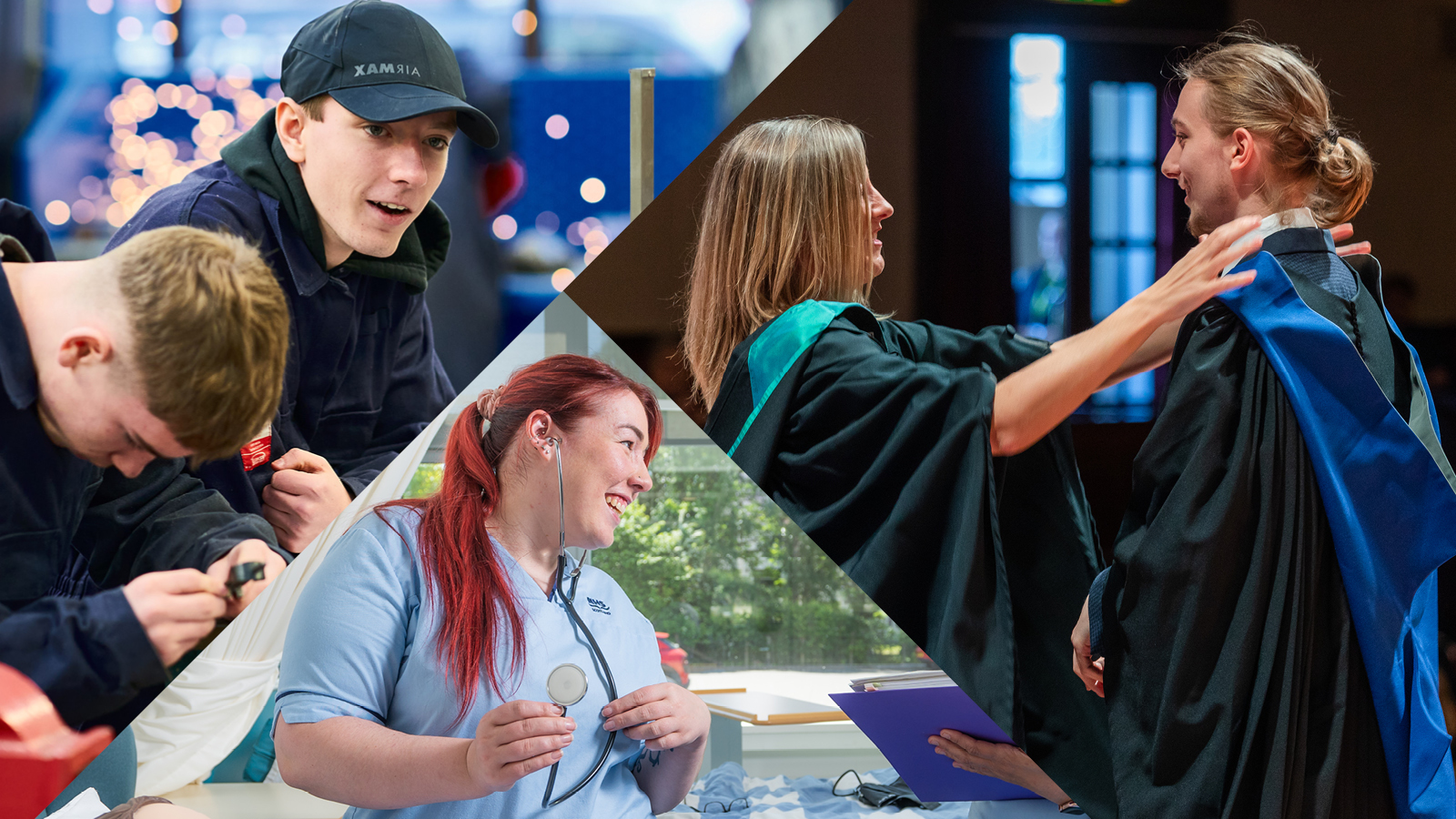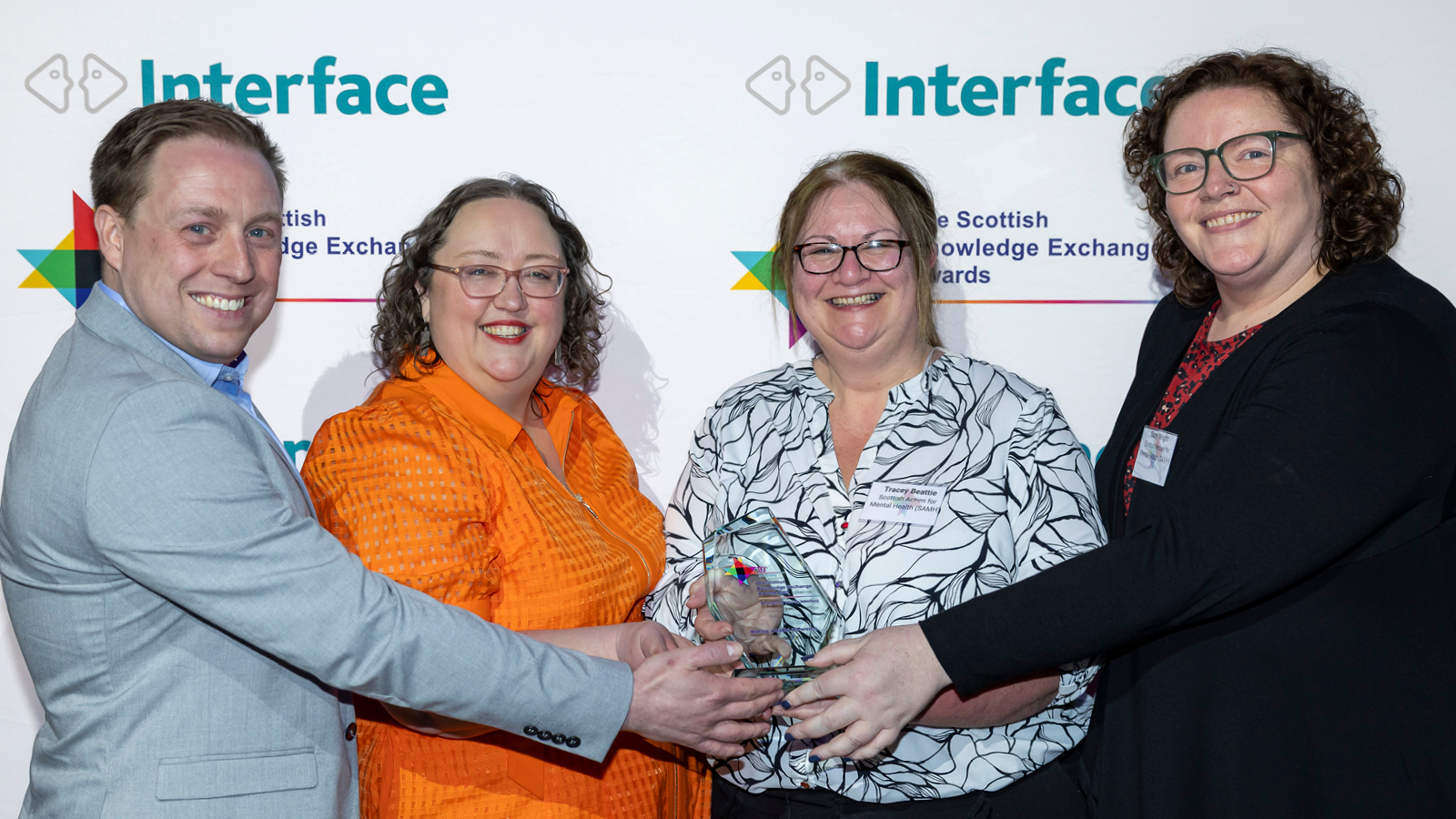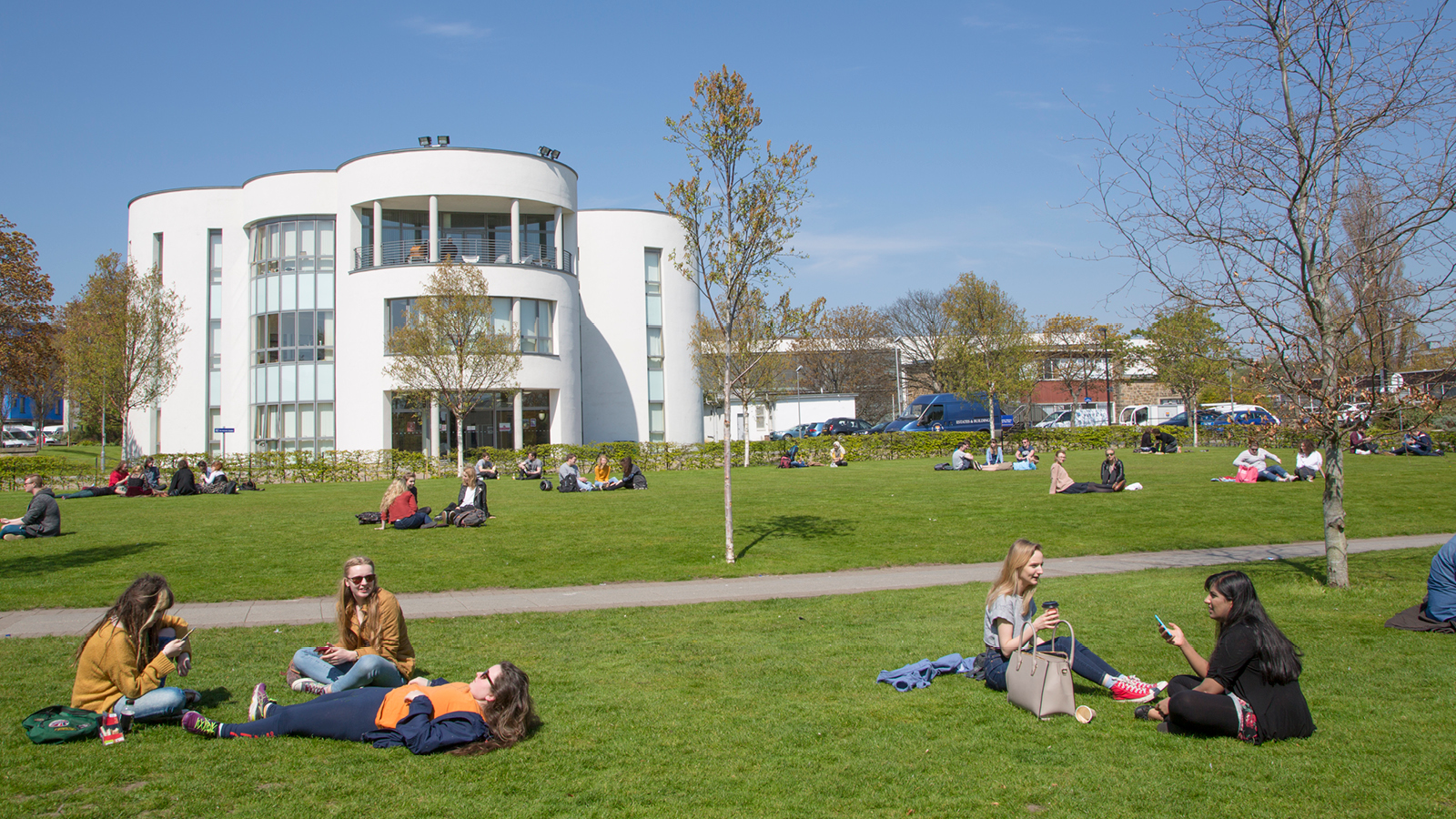

The Minister for Higher and Further Education has announced that Professor Cara Aitchison has been appointed as Chair of the Scottish Funding Council. Professor Aitchison has been Interim Co-Chair since April 2025, working alongside Deputy Chair, Lorna Jack.
Professor Aitchison has had a distinguished academic career holding senior leadership roles in Scotland, the wider UK, and internationally – including over a decade as a successful university principal in England and Wales. She is an Honorary Professor at the University of Edinburgh’s Moray House School of Education, where she was previously Head of School, and Professor Emerita in Geography and Cultural Economy at Cardiff Metropolitan University where she was previously President and Vice-Chancellor.
Amongst Professor Aitchison’s previous contributions in the public sphere are membership of the Economic Growth Board of Cardiff Capital Region and the Council of CBI Wales. She was also chair of Universities UK’s Staff-Student Sexual Misconduct Advisory Group and Chair of the Wales-Ukraine Universities Group established by Universities Wales and Welsh Government.
A native of Stirling, Professor Aitchison is a Fellow of the Academy of Social Sciences, the Royal Geographical Society, the Learned Society of Wales, and the Higher Education Academy.
Commenting on Professor Aitchison’s appointment, Higher and Further Education Minister, Graeme Dey, said
“Professor Aitchson brings with her extensive knowledge and experience and I am confident that she is absolutely the right appointment to lead the board of the Scottish Funding Council.
“We are embarked upon a significant reform programme, encompassing the entire post-school education and skills landscape, within which it is intended the SFC will take on important additional responsibilities.
“Having worked with her over the past few months I am in no doubt that Professor Aitchison is the right person to take on this role and help shape the short, medium and long term direction of a repurposed SFC.’’
Welcoming the appointment, Francesca Osowska, Chief Executive of the Scottish Funding Council, said:
“I am very much looking forward to working with Cara as our new Chair and join the other members of the Board and SFC staff in welcoming her to the role.
“Her wide understanding of tertiary education and research will be a huge asset to the Scottish Funding Council, as will her track-record of business partnership.”
Professor Aitchison said:
“I am delighted to take on a role that is pivotal to enabling successful outcomes for students, communities, and the economy across the whole of Scotland.
“I would like to take this opportunity to pay tribute to the work of my predecessor, Mike Cantlay, and to recognise the significant contribution over the last few months of Lorna Jack with whom I’ve greatly enjoyed sharing the role of Interim Chair; I very much look forward to continuing to work with Lorna as she resumes her role as Deputy Chair.
“I’ve been very impressed by the leadership and staff within SFC and by the commitment of the Board; we are well placed to deliver the reform programme while supporting colleges and universities to deliver education, research, innovation and skills within a very challenging financial environment. ”
Further details can be found on the Scottish Government website.

Photo (left to right): Newbattle Abbey College, UHI Perth, Fife College, City of Glasgow College
The Scottish Funding Council has published its College Student Outcomes report for the academic year 2023-24. The report, previously titled ‘College Performance Indicators’, takes a sector-wide look at the performance of Scotland’s colleges and illustrates trends over the past five years.
The publication reports rates of early withdrawals (criteria laid out in SFC’s Credit Guidance for Colleges 2024-25) and rates of non-completion, a new measure which focuses on those students who did not withdraw from their course early, bringing in changes which were strongly supported in a consultation about the publication held last year.
This week’s figures show that over two thirds of full-time students (67.1% for further education and 66.9% for higher education) successfully completed their courses in the latest year. Early withdrawals are at historic lows of 4.6% for further education and 3.0% for higher education, as students at college are increasingly likely to continue their studies for longer.
Enrolments for higher education students rose by 1% (240 enrolments) and by 4.1% (1,612 enrolments) for further education full-time students.
The report also found that male students were more likely than female students to successfully complete their further education programme while the opposite was true for higher education.
Full details of all the findings in this week’s report are now available along with supporting documentation.

Photo: University of Dundee
The Scottish Funding Council (SFC) has today, 19 June 2025, published the findings of an independent investigation into the circumstances that led to the financial challenges facing the University of Dundee.
Led by Professor Pamela Gillies and conducted by international professional services firm, BDO, the independent investigation was commissioned to understand the reasons why the University of Dundee’s financial position deteriorated so seriously and apparently so suddenly. The investigation’s findings were presented to staff and students at a Townhall meeting at the University today before being published on SFC’s website and shared with wider stakeholders.
Key findings from the investigation are as follows:
- Poor financial judgement.
- Inadequate management and reporting.
- Poor monitoring of the financial key performance indicators.
- Lack of agility by leadership in responding to a fall in income.
- Weak governance in relation to financial accountability by the Court.
Commenting on the report, SFC Chief Executive, Francesca Osowska, said:
“We would like to thank everyone who has taken the time to engage with the independent investigation into the circumstances that led to the serious financial challenges facing the University of Dundee. We recognise that this has been, and continues to be, an unsettling time for staff and students, and we are grateful to everyone who has supported the Investigation Team in doing its work.
“Given the seriousness of the situation, it was important that the investigation was conducted with rigour and transparency. We welcome the robust and comprehensive report that has been provided by Professor Gillies and the team at BDO.
“The report has identified a range of issues that contributed to the financial challenges facing the University, however, it is quite clear that there have been failures in financial monitoring and reporting, and failures in governance. We will now take the time reflect on the actions, both immediate and longer-term, that should be taken to minimise the risk of this situation happening again.”
A copy of the report has been shared with the University Court and SFC will engage with the University as it develops and implements an action plan to address the main findings.
The full report is available on the Scottish Funding Council website.

A report published today by the Scottish Funding Council (SFC) has recommended that the funding body and the College Development Network (CDN), the national enhancement and improvement agency for Scotland’s colleges, work together to meet emerging professional development needs in colleges. This includes collaborating on work in relation to the implementation and delivery of Scotland’s Tertiary Quality Enhancement Framework and in support of the training and development of college staff and governors and developing professional best practice.
The report, which forms part of SFC’s commitment to understanding the outcomes and impacts of its funding, incorporates views from a survey of college leaders. It also takes into account interviews with people CDN’s services and a review of ongoing performance data provided to the Scottish Funding Council. The College Development Network currently receives around £1.4 million of annual funding from SFC.
The report found that CDN’s work reflected the priorities of both the Scottish Government and the Scottish Funding Council, and that recent changes to its leadership and operations have had a positive effect on the organisation’s ability to engage with and better understand the needs of colleges. There was also recognition for CDN’s effectiveness as a key intermediary and enabler bringing together staff and boards across the college sector and other sector agencies involved in tertiary education.
Amongst the report’s further recommendations are the active exploration of other opportunities for collaboration and for the building of a better appreciation of the part partner agencies play in learning and quality improvement for Scotland’s colleges.
Francesca Osowska, Chief Executive of the Scottish Funding Council, said:
“Good evaluation is a fundamental part of the Scottish Funding Council’s ambition of creating a connected, agile and sustainable tertiary education and research system for Scotland.
“It’s not just about looking at the work of organisations that receive our funding, it’s also about SFC thinking about its own role as a provider of funding and as a strategic partner supporting the success of its investments for students, communities and the economy.
“I look forward to working alongside CDN to implement the recommendations of the report and achieving even greater success in the future.”
Marie Hendry, Chief Executive of the College Development Network, said:
“We welcome the findings of this important evaluation and are pleased to see recognition of the value and impact of CDN’s work across Scotland’s college and wider tertiary sectors.
“It’s particularly encouraging to see our role as a connector and enabler of professional learning and quality improvement acknowledged. We look forward to continuing our close collaboration with the Scottish Funding Council as we respond to emerging priorities together and welcome SFCs ongoing commitment to CDN’s role and our impact.
“By working in partnership, we can help shape a responsive, future-focused system that supports college staff and delivers meaningful benefits for learners and communities across Scotland.”
Professor Ken Thomson OBE, Chair of College Development Network (CDN), said:
“We welcome this important report and look forward to working with SFC and colleagues and partners across the sector to take forward its recommendations.
“The report highlights the critical work of CDN in delivering for colleges and the wider tertiary sector through our enhancement, improvement and quality work and we are grateful to SFC for its ongoing commitment to supporting CDNs strategic ambitions. We are particularly grateful to those colleges, partners and colleagues who took the time to respond to the review and for their positive feedback on CDN’s renewed focus on prioritising engagement and impact.”
Today’s report is part of an ongoing series of evaluations of SFC’s strategic funding which will be made available to colleges, universities and the wider public on the SFC website.
You can find the today’s report on the new Evaluation of Investments page of the SFC website.

Photos: University of Dundee, University of the Highlands and Islands, Edinburgh Napier University and University of Edinburgh.
The vital role that university research and innovation play in society, the economy and the environment was the theme of a visit to Heriot-Watt University today by the Minister for Higher and Further Education, Graeme Dey.
The minister toured the Medical Device Manufacturing Centre (MDMC), a partnership between Heriot-Watt, Robert Gordon University and the universities of Edinburgh, Glasgow and Dundee. The Centre provides specialist advice on a no-cost basis to medical manufacturers across Scotland. The team at MDMC includes engineers, scientists, and clinicians, and has the equipment and expertise to support companies through prototyping and feasibility testing.
The visit also marks the launch of a Scottish Funding Council campaign to promote the importance of research and innovation for four key priorities within the Scottish Government’s programme for government. Universities across Scotland have contributed to a new collection of case studies to showcase the impact of their research and innovation in the areas of eradicating child poverty; growing Scotland’s economy; tackling the climate change emergency; and improving public services.
Higher Education Minister, Graeme Dey, said:
“Supporting research and innovation is of high importance to the Scottish Government, which is why we increased our underpinning investment in Higher Education capital, which includes funding for research by over £11 million.
“Today’s visit was an opportunity to see why the sector is so important – research at the Medical Device Manufacturing Centre is transforming the delivery of healthcare through its expertise in robotics, photonics and AI.
“More broadly, the spotlight case studies published today demonstrate the vital contribution of our research and innovation sector in supporting the Scottish Government to meet its ambitions around eradicating child poverty, growing the economy, tackling the climate emergency and improving public service across the country. We will continue to work closely with the sector as we work to make those ambitions a reality.”
The Scottish Funding Council’s Chief Executive, Francesca Osowska, said:
“At the Scottish Funding Council we have a privileged view of the incredible work Scotland’s universities do across a vast and varied range of research and innovation activities.
“The impact of this work is felt here in Scotland and in countries across the world, and it’s making a real difference to people’s lives, their prosperity and the future sustainability of our planet.
“The new case studies we’re spotlighting from today will help to spread the word about this amazing work beyond SFC, universities and government and help more people understand the importance of Scottish research and innovation”.
The case studies are now available on the SFC website.

Photos: Edinburgh College, UHI Perth, Glasgow Clyde College.
The Scottish Funding Council has published its latest report on staffing in Scotland’s colleges. The report covers the period from 2014-15 to 2023-24.
The figures published today show colleges employed 10,112 full-time equivalent (FTE) staff in 2023-24, a decrease of 7.7 % on the previous year and a 6.4% drop on the equivalent figure a decade ago. The ratio of teaching staff to non-teaching staff in Scotland’s colleges remains the same as in 2022-23. Just under half (49 per cent) were teaching staff with the remaining 51 per cent employed in non-teaching roles.
According to the report, the proportion of full-time permanent teaching staff with a recognised teaching qualification also remains the same as in 2022-23, and represents a rise of almost two per cent since 2021-22.
A notable change since the previous report, however, has been in the proportion of females in senior management roles which has risen by just over 3 percentage points since 2022-23
Full details are now available – see College Staffing Data 2023-24

Photo: University of Dundee
Responding to the University of Dundee’s update on an alternative recovery plan, Scottish Funding Council Chief Executive, Francesca Osowska, said:
“The University of Dundee is a world-class institution with a global reputation for teaching and research excellence. We welcome the commitment from the leadership team to securing its continued success and to responding to feedback from staff, students and the wider community, all of whom have a role to play in ensuring that the University survives and thrives into the future.
“We recognise that the details of this alternative recovery plan are still to be finalised and will continue to work alongside the University as it manages itself back into a position of financial health. Our Board approved a financial support package in March and we will consider any request for further financial support. We will also play a full part in the Regional Taskforce chaired by Sir Alan Langlands and welcome the collective commitment to support the University in ensuring its short, medium and long term sustainability.”

Photo: University of Glasgow
The Scottish Funding Council (SFC) has issued a call for proposals today for a fund designed to support the setting up of new shared services for research and innovation.
Alongside the rest of the UK’s higher education sector, Scottish universities are taking measures to secure their long-term financial sustainability in the face of current fiscal challenges. SFC has set up the R&I Shared Services Collaboration Fund to support universities by helping them to explore the potential of shared services as a way of creating efficiencies.
The fund, worth up to £3 million over two years, will help Scottish universities build on a legacy of working closely together through research pooling, innovation centres and, most recently, the Alliances for Research Challenges.
According to the team behind it, possibilities offered by the new fund include the sharing of Tech Transfer Offices (TTOs) and research offices. These would have the added benefit of allowing universities with smaller research portfolios to benefit from the expertise and capabilities of other institutions.
Helen Cross, SFC’s Director of Research and Innovation, said:
“ The R&I Shared Services Collaboration Fund is a direct response to what we have been hearing from research and innovation leaders in universities. It’s a practical measure that supports something that is already being looked at in the sector.
“I’m really pleased we have been able to respond quickly as a funding council. I’m confident the fund will help to ensure institutions’ own ideas for shared services to come to fruition.”
The Call for Proposals is available on the SFC website. The deadline for proposals is Friday 29 August and the awards will be announced in early October.

Photos: UHI Perth, Forth Valley College, Dundee and Angus College
The Scottish Funding Council (SFC) has published its latest report on the outcomes of people leaving college.
For the academic year 2022-23 the report shows that more people are choosing to stay in college rather than leave. For those who do leave, the statistics also show that more of them are moving on to positive destinations.
For 2022-23, SFC had confirmed destinations for 89% of those studying at college full-time. 39% of those with known destinations were leaving college education while the other 61% chose to continue their study at college. Of those that were sector leavers, 87% went onto positive destinations. This was a slight increase from the previous academic year.
Successful qualifiers are those who have successfully completed a full-time course and either left the college sector or are remaining at college to complete a subsequent qualification. The total number of qualifiers in 2022-23 increased by 388 from the previous year. Of those qualifiers, the number with a confirmed destination increased to 89%.
Of the successful qualifiers with a confirmed destination, the proportion who remained in college increased from the previous year to 61%%, while the number of sector leavers decreased to 39%. The proportion of qualifiers who have chosen to continue college study was at similar levels to during the COVID-19 pandemic.
Commenting on the findings, Martin Boyle, Chief Operating Officer at the Scottish Funding Council, said:
“It is encouraging to see that there has been a slight increase in the number of people leaving the college sector going onto positive destinations.
“The report shows the value of the work done by Scotland’s colleges and the importance of the pathways that exist between colleges, universities and employers in Scotland.”

Photo: University of Dundee
Following last month’s announcement of an independent investigation into the University of Dundee’s finances, the Scottish Funding Council (SFC) has appointed a cross-discipline team from the international professional services firm, BDO to carry out the probe.
The investigation is designed to determine the causes and contributing factors to the deterioration of the University of Dundee’s financial position and will be overseen by Professor Pamela Gillies, former Principal at Glasgow Caledonian University.
Amongst the important tasks the team will undertake is an examination of the role of management and governance. It will also look at information flow, cultural issues, and whether appropriate questions were asked at the university’s executive group, court and committees.
BDO is well respected and highly experienced in its field, including in the fiscal management of higher education institutions in financial distress. It also has significant experience of university governance, having been consulted in the development of governance codes and the sector’s audit code of practice.
Additionally, the team has undertaken investigations on behalf of government, funders and regulators and has significant expertise in processing information and evidence for court or criminal investigations, where they become necessary.
Jacqui Brasted, SFC Interim Director of Access, Learning and Outcomes, said:
“It is vital that the circumstances surrounding the financial challenges at the University of Dundee are investigated with rigour and transparency, and that lessons are learned to minimise the risk of this situation happening again.
“Today’s announcement of the experts to carry out the investigation is an important step forward. They will have full access to all appropriate documents and will be meeting with a wide range of people including the University’s executive team, trade unions, regulators and, where possible, former members of staff.”
The independent investigation will provide the opportunity for the University of Dundee to learn lessons from the circumstances that led to the deterioration of its finances. The Scottish Funding Council will also share any wider lessons learned with other universities and colleges in Scotland.

Photos: Edinburgh College, UHI Perth, Glasgow Clyde College.
The Scottish Funding Council (SFC) has announced its indicative college funding allocations for the next academic year.
The announcement includes an uplift to teaching funding of over £13 million – a 2.6% increase from last year. The budget for capital maintenance, which helps to maintain and improve buildings and infrastructure, has been increased by almost 5%. Today’s indicative funding allocations also see the student support budget maintained at the same level as last year, despite the current pressures on the public purse.
Today’s announcement includes changes to SFC’s teaching funding allocation model to provide greater transparency and the ability to compare funding for students on similar courses.
Commenting on the announcement, SFC Chief Executive, Francesca Osowska, said:
“In a difficult financial environment we have worked hard to balance out sometimes competing priorities and put students’ learning at the forefront of our considerations. Changes announced today follow discussions with key groups within the sector and are accompanied by measures to mitigate any adverse impact on individual colleges.
“The announcement looks towards safeguarding college education in the long term as well as supporting next year’s college students by investing in the opportunities they deserve.”
A copy of the full announcement can be found on the SFC website.

Photos: University of Aberdeen, University of Glasgow, University of St. Andrews
The Scottish Funding Council (SFC) has today published indicative allocations for Scotland’s universities.
As planned, today’s announcement confirms the removal of 2,500 temporary places that were made available in 2021-22 to support additional learners through the Covid-19 period. These learners will be graduating at the end of this academic year.
With an increase of £12.9m from the Scottish Government budget and a repurposing of monies previously associated with that cohort of students now graduating from the system, SFC has been able to increase the investment in each individual learner (the unit of teaching resource).
Today’s indicative allocations also announce an increase of £11.3m in core university research and innovation funding which will be allocated across the Research Excellence Grant, the Research Post-Graduate Grant and the Knowledge Exchange and Innovation Fund.
Commenting on today’s announcement, SFC Chief Executive, Francesca Osowska, said:
“We recognise that universities are operating in a difficult financial environment with pressures across the full range of funding streams that drive our institutions. Today’s funding announcement will enable them to increase investment in each individual learner, protecting the high-quality of teaching for which our universities are renowned, while also securing Scotland’s position in delivering world-leading research and supporting new discoveries through innovation.”
A copy of the full announcement can be found on the SFC website.

Photos: UHI Perth, University of Glasgow
A new resource hub, developed jointly by four Scottish quality agencies, has been launched with the aim of supporting the delivery of active blended learning in universities and colleges.
The hub, which presents resources for the ‘Planning and Delivery of Active Blended Learning’, was developed by QAA Scotland, Education Scotland, College Development Network (CDN) and Student Partnerships in Quality Scotland (sparqs).
The hub aims to introduce the concept of active blended learning, help guide educators to prepare design for active blended learning, and provide practical examples of good practice.
The hub is designed to be used in different ways depending on user need and prior knowledge. Its two introductory sections offer theoretical and contextual backgrounds to the resources and their applications. The third section introduces tools and approaches that can be used to support the development of active blended learning, while the final section explores how to issue guidance to learners when introducing active blended learning.
It is the final output of a wider two-year initiative aimed at supporting the future delivery of effective and inclusive digital and blended learning. The initiative, which explored The Future of Learning and Teaching: Defining and delivering an effective and inclusive digital/blended offering, was the first cross-sector, tertiary enhancement project of its kind and was initiated by the Scottish Funding Council to help Scotland’s colleges and universities better understand the opportunities and the challenges presented by new technology.
The new resource hub addresses needs identified through the research that was carried out by the project team and published by the Scottish Funding Council in February 2024.
Karen Gray, Assistant Director, Learning and Quality at the Scottish Funding Council, said:
“Based on research, the new hub meets a real need in Scottish tertiary education. It’s the result of a ground-breaking partnership and has benefited greatly from the expertise and experience available across QAA Scotland, Education Scotland, CDN, sparqs and the sector.
“It completes a long-term initiative and at the same time points the way towards similar partnerships for success in the future”
Debra Macfarlane, Director of Regulatory Services at QAA, said:
“This resource offers a perfect blend of insightful information, practical resources and examples of good practice. Cross-organisational working has delivered huge benefits in creating a resource hub which is designed to appeal to a wide range of stakeholders.”
Gordon Hunt, Head of Insight, Planning and Impact at CDN, said:
“CDN is proud to have been part of this ground-breaking project, which brought together enhancement partners from across the tertiary sector. The hub is a fantastic resource for colleagues in our tertiary institutions and will help ensure that inclusive and effective blended learning continues to enhance the experience of learners across the sector.”
Gill Ritchie, Strategic Director of Inspection at Education Scotland, said:
“This helpful resource is the result of both cross-sectoral and cross-agency collaboration and provides a useful touchpoint for the ongoing development of blended learning across the tertiary sector. It was a pleasure working alongside our agency partners in supporting its development.”
Eve Lewis, sparqs director, said:
“During sparqs’ recent series of institutional visits, the ways in which institutions make decisions about the balance of online and face to face teaching and the development of high-quality blended learning approaches emerged as key topics.
“Students have so much expertise to add to these discussions and the hub provides an excellent set of resources that can support these conversations.”
Planning and Delivery of Active Blended Learning is now available on the QAA website.

Photo: WorldSkills UK
Scottish students and apprentices are amongst the 80 young people selected to join an intensive training programme designed to select the UK team for the 2026 WorldSkills Competition in China.
Amongst those hoping to showcase their skills on an international stage are over a dozen Scots. Between them they cover eight skills areas including digital construction, IT systems administration and renewable energy. Five Scottish colleges are represented in the squad as well as Glasgow Caledonian University.
WorldSkills UK uses its participation in the international WorldSkills competition to promote skills excellence and embed world class training standards throughout the whole of the UK skills sector. The process is helping to meet the demand for highly skilled people in crucial areas of the economy including engineering, digital, manufacturing and construction.
Worldskills 2026 will be the first time China has hosted the prestigious WorldSkills competition. The event will see 1,500 young people travel to Shanghai from over 80 countries. The UK will be competing in more than 30 skills categories.
Ben Blackledge, Chief Executive, WorldSkills UK said:
“We are so excited to welcome this fantastic group of young technicians on to our international programme.
“They will be developing the skills that employers are crying out for and which will fuel business growth across our economy.
“WorldSkills Shanghai 2026 will be bigger than ever before with even higher standards, giving us a vital platform to learn from the very best in the world and bring skills excellence to more young people across the UK.”
Education Secretary, Jenny Gilruth, said:
“Congratulations to everyone that has been selected for the WorldSkills training programme. This is a fantastic opportunity for young people to take their learning to the next stage, whilst getting a potential opportunity to showcase the best Scotland has to offer in skills excellence on the world stage.
“Continual skills development is hugely important as we navigate the challenges and opportunities in a rapidly changing world, and the Scottish Government values the work that WorldSkills UK is doing in this area. I have no doubt that this training programme will provide life-changing experiences for all of those selected.”

Photos: Edinburgh College, University of Glasgow, UHI Perth and University of Aberdeen
The minister for further and higher education has appointed Lorna Jack and Professor Cara Aitchison as co-interim chairs of the Scottish Funding Council (SFC).
Lorna Jack, who brings extensive financial expertise and experience, is currently SFC’s deputy chair, chair of the finance committee, and a member of the remuneration and nominations committee. Professor Aitchison, who brings extensive experience of higher education leadership across the UK and internationally, is a member of the research and knowledge exchange committee and also sits on the finance committee.
The appointments come as the current chair, Mike Cantlay, approaches the end of his term in office. He leaves the position on 2 April after seven and a half years of leading SFC’s Board.
During his time at the helm, Dr Cantlay has led the funding body through the challenges of the COVID-19 pandemic and a major re-evaluation of tertiary education and research in Scotland. He has also guided SFC through the recent review of skills delivery which culminated in the Scottish Funding Council taking responsibility for the funding of all post-16 provision.
Under his leadership, SFC has developed excellent relationships with the Scottish Government, with the college and university sectors, and more recently with employer bodies.
Dr Cantlay said:
“We were disappointed a candidate for the permanent post of chair was not secured during the initial appointment process.
“However, I’m confident a refreshed approach will attract considerable and widespread interest for what is one of the most interesting and rewarding posts in the Scottish public sector.”
“In the meantime, Lorna and Cara’s combined insight, knowledge, and experience will be invaluable as SFC progresses the reform programme and continues to support colleges and universities as they navigate a challenging financial environment.”
The process to appoint a permanent Chair will commence shortly.

Photo: Edinburgh Napier University
The Scottish Funding Council (SFC) has announced the next stage of funding for the EAUC’s environmental sustainability programme. The announcement means the programme, which serves Scotland’s universities and colleges, will be funded until summer 2026.
Working to put sustainability at the heart of tertiary education and research, EAUC Scotland will use the funding to support effective leadership and action towards tackling the climate and ecological emergencies. Plans for the next 16 months include developing climate risk profiles for institutions and piloting a ground-breaking Education for Sustainable Development programme.
In the past year EAUC Scotland has organised over 30 events, training sessions and webinars, and provided Scottish universities and colleges with a series of vital new resources including a biodiversity strategy and a guide to conducting staff and student commuting surveys.
EAUC Scotland’s environmental sustainability programme has helped to increase the understanding of tertiary education’s role in response to the climate emergency. It has also helped colleges and universities improve sustainability both within their institutions and in the wider community.
Matt Woodthorpe, Scotland Programme Manager at EAUC, said:
“It’s fantastic that EAUC’s partnership with the Scottish Funding Council continues into 2025 and 2026 – a partnership that started in 2008.
“This is a critical time for sustainability in Scotland, and we look forward to working with colleges, universities, SFC and wider partners to deliver long term environmental, social and economic benefits.”
Martin Boyle, Chief Operating Officer at the Scottish Funding Council, said:
“We’re committed to supporting progress towards a more sustainable future. In the past year EAUC Scotland has once again been ambitious and energetic in driving forward its environmental sustainability programme for tertiary education.
I’m really pleased SFC is able to extend its funding into 2026 and I’m confident that our ongoing investment will continue to make a difference in tackling the climate and ecological emergencies”.

Photo: University of Dundee
The Scottish Funding Council (SFC) has today published the terms of reference for an independent investigation to determine the causes and contributing factors to the deterioration of the University of Dundee’s financial position which came to light in November 2024. The publication follows last week’s announcement that Professor Pamela Gillies, former Principal at Glasgow Caledonian University, has been appointed to oversee the investigation.
The investigation will seek to understand the reasons why the University’s financial position deteriorated so seriously and apparently so suddenly. It will consider the role of management and governance in the deterioration; the information flows; any cultural issues; and whether appropriate questions were asked at the University Executive Group (UEG), Court and its committees.
The investigation will provide the opportunity for the University to learn lessons from the circumstances that led to the deterioration. SFC will also share any lessons that might be beneficial to the wider sector across Scotland.
The team that will support Professor Gillies will have full access to all appropriate documentation and will have the opportunity to engage with members of the Executive Team and members of the University Court as well as trades unions, regulators, contractors or wider stakeholders. Where possible, the Investigator and team will be encouraged to speak with former members of staff. University staff and students or members of Court may request an opportunity to provide evidence to the investigation team.
Francesca Osowska, SFC Chief Executive said:
“The University of Dundee is one of Scotland’s world-leading institutions and we are committed to working alongside its senior team as it finalises and delivers a financial recovery plan that will see it return to a position of financial health.
“Alongside this work, it’s vital that the circumstances surrounding the financial challenges at the University are fully investigated, with rigour and transparency, and that lessons are learned to minimise the risk of this situation arising again.
“The appointment of an independent team will ensure a robust process. We will share the findings once this work has concluded and expect the University to act on those findings.”
We are open to comments on the Terms of Reference. These should be sent to enquiries@sfc.ac.uk by 31 March 2025.

From left to right: Dr Bryan McCann (Glasgow Caledonian University), Helen Cross (Scottish Funding Council), Tracey Beattie and Suzy Wright (Scottish Action for Mental Health).
Scotland’s rich ecosystem of talent came together last week to celebrate transformational collaborations between businesses, communities, universities, colleges, and research institutes.
With the spotlight on solving challenges; greater productivity; and research and innovation, awards went to projects in renewable energy, mental health, medicine and food and drink.
The award for Making a Social Difference was presented by the Scottish Funding Council’s Director of Research and Innovation, Helen Cross.
Business Minister, Richard Lochhead, said:
“Scotland has been at the forefront of many of the world’s most impactful innovations, from the MRI scanner and penicillin to televisions and telephones. Yet, by combining research and business, so many new and exciting Scottish breakthroughs are just on the horizon and that is something we should all champion.”
Amelia Whitelaw, Director of Interface, which organises the Awards, said:
“The Scottish Knowledge Exchange Awards celebrate successful partnerships where knowledge is shared to create new solutions.
“The nominees and winners we are celebrating exemplify how collaboration drives valuable advancements. These partnerships have led to the development of new technologies, products, and services that contribute to economic progress and societal benefit.”
The full list of winners is available on the Interface website.

Photo: University of Dundee
The Scottish Funding Council (SFC) has today (20 March 2025) announced a funding package for the University of Dundee to support the University in addressing immediate financial challenges.
The University of Dundee notified SFC of significant financial challenges in November 2024 and SFC has been engaging closely with the institution since to understand the extent of the challenge. Following Scottish Government announcements of additional funding being made available to the sector, the SFC Board approved today a support package of £22m, a mix of financial transactions (low-cost loans) and capital grant.
Commenting on the support package, SFC Chief Executive Francesca Osowska said:
“We recognise the significant uncertainty and anxiety that staff and students are experiencing at the University of Dundee. Given the important role that the University plays in the city and the surrounding region, we also acknowledge the concerns of the wider community.
“The University of Dundee is a world-leading institution with a rich heritage in delivering excellent student outcomes and world-leading research.
“We are committed to supporting the University, and the funding approved by the SFC Board today will support the University as it develops its financial recovery plan to return to a position of financial health.
“More broadly, our focus remains on making Scotland an outstanding place to learn, educate, research and innovate, both now and for the future.”

Photos: University of Aberdeen, Borders College, SRUC, University of Glasgow.
The Scottish Funding Council (SFC) has published a new series of exploratory reports. They map out ways to improve how people move through tertiary education and develop the skills needed by regional economies.
The Pathfinders reports are the result of a £500,000 development programme led by SFC under the umbrella of the Scottish Government’s shared outcome framework for skills, which brings together collaborative projects undertaken by the Scottish Funding Council and Skills Development Scotland and which feed into the National Strategy for Economic Transformation.
The SFC programme comprised seven regional Pathfinders projects that were used as test beds for innovation, and which exemplified the programme’s hands-on, learning by doing approach. The projects were in the South and North-East of Scotland and were led by regional partnerships that went beyond colleges and universities to include organisations such as enterprise bodies, local councils and health authorities.
The resources published today capture the views and experiences of people involved in the pilot projects. They include reflections on the challenges they faced as well as thoughts on what they found useful, motivating and rewarding.
As well as the final reports from each of the seven pilot projects, an overarching report brings together insights from across the whole programme. There are also papers reflecting on what was learnt about curriculum development and the use of data and other sources of evidence.
Francesca Osowska, Chief Executive of the Scottish Funding Council, said:
“We set out to explore how we can make the education and skills system more responsive, more integrated, and more able to support regional economies.
“The Pathfinders programme has given us a lived-through experience of making new and different things happen and being able to reflect on their impacts. I’m really grateful to all the people in colleges, universities and regional organisations that have been involved along the way.”
“Inspired by what we’ve learnt through this programme, I hope colleges and universities across Scotland will use the Pathfinders resources to add impact to their own work in the future”.
The full suite of Pathfinders reports is now available on the SFC website.